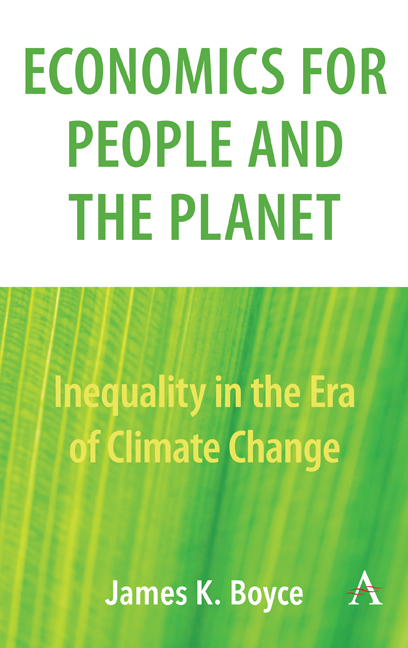Book contents
- Frontmatter
- Contents
- List of Illustrations
- Acknowledgements
- Part I Rethinking Economics and the Environment
- Chapter 1 Limits to Growth–of What?
- Chapter 2 The Twin Tragedies of Open Access
- Chapter 3 Pursuing Profits–or Power?
- Chapter 4 Rent in a Warming World
- Chapter 5 Universal Assets for Universal Income
- Chapter 6 Universal Basic Income: Six Questions
- Chapter 7 Environmentalism's Original Sin
- Chapter 8 Rethinking Extinction
- Part II Environmental Injustice
- Part III Climate Policy
- Notes
- Publication History
- Index
Chapter 1 - Limits to Growth–of What?
from Part I - Rethinking Economics and the Environment
Published online by Cambridge University Press: 12 February 2019
- Frontmatter
- Contents
- List of Illustrations
- Acknowledgements
- Part I Rethinking Economics and the Environment
- Chapter 1 Limits to Growth–of What?
- Chapter 2 The Twin Tragedies of Open Access
- Chapter 3 Pursuing Profits–or Power?
- Chapter 4 Rent in a Warming World
- Chapter 5 Universal Assets for Universal Income
- Chapter 6 Universal Basic Income: Six Questions
- Chapter 7 Environmentalism's Original Sin
- Chapter 8 Rethinking Extinction
- Part II Environmental Injustice
- Part III Climate Policy
- Notes
- Publication History
- Index
Summary
Environmentalism needs a new banner: Grow the good and shrink the bad.
Average national income is a notoriously imperfect measure of the average person's well-being. The 2010 BP oil spill in the Gulf of Mexico–with clean-up and damage costs of $90 billion–added about $300 to the average American's ‘income’. But it added nothing to the nation's well-being. The world's most expensive prison system, costing almost $40 billion per year, adds another $125 per person. This doesn't make the country's residents better off than people living in countries that don't incarcerate one in every 100 adults.
Of course, national income includes many good things, too. Growing food and building homes add to national income. So does public spending on education and healthcare. Unlike oil spills and jails, these really do add to human well-being.
Along with good stuff and bad stuff, national income includes a third category of stuff that is just useless–goods and services that neither add to our well-being nor subtract from it but still get counted in the income pie. A prime example is what the economist Thorstein Veblen called ‘conspicuous consumption’–items consumed not for their intrinsic worth but simply to impress other people and jockey for a higher rung on society's pecking order. These goods and services have zero net effect on national well-being, since for every person who climbs a rung, someone else slips one.
Of course, not all bad or useless things are counted as national income. But neither are all good things. Unpaid work caring for children, the elderly and the disabled doesn't count. Clean air, clean water and climate stability don't count. Free, open-source information and culture don't count.
The national income pie is an odd subset of the good, the bad and the useless. All three slices get lumped together when economists tell us that average income in the United States is roughly $56,000 per person.
Researchers in the emerging field called ‘happiness studies’ have devised other ways to measure well-being.
- Type
- Chapter
- Information
- Economics for People and the PlanetInequality in the Era of Climate Change, pp. 3 - 6Publisher: Anthem PressPrint publication year: 2019



